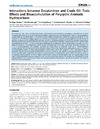Identificador persistente para citar o vincular este elemento:
https://accedacris.ulpgc.es/jspui/handle/10553/75470
| Título: | Interactions between Zooplankton and Crude Oil: Toxic Effects and Bioaccumulation of Polycyclic Aromatic Hydrocarbons | Autores/as: | Almeda García, Rodrigo Wambaugh, Zoe Wang, Zucheng Hyatt, Cammie Liu, Zhanfei Buskey, Edward J. |
Coordinadores/as, Directores/as o Editores/as: | Johnson, Stephen J. | Clasificación UNESCO: | 251001 Oceanografía biológica | Fecha de publicación: | 2013 | Publicación seriada: | PLoS ONE | Resumen: | We conducted ship-, shore- and laboratory-based crude oil exposure experiments to investigate (1) the effects of crude oil (Louisiana light sweet oil) on survival and bioaccumulation of polycyclic aromatic hydrocarbons (PAHs) in mesozooplankton communities, (2) the lethal effects of dispersant (Corexit 9500A) and dispersant-treated oil on mesozooplankton, (3) the influence of UVB radiation/sunlight exposure on the toxicity of dispersed crude oil to mesozooplankton, and (4) the role of marine protozoans on the sublethal effects of crude oil and in the bioaccumulation of PAHs in the copepod Acartia tonsa. Mortality of mesozooplankton increased with increasing oil concentration following a sigmoid model with a median lethal concentration of 32.4 µl L−1 in 16 h. At the ratio of dispersant to oil commonly used in the treatment of oil spills (i.e. 1∶20), dispersant (0.25 µl L−1) and dispersant- treated oil were 2.3 and 3.4 times more toxic, respectively, than crude oil alone (5 µl L−1) to mesozooplankton. UVB radiation increased the lethal effects of dispersed crude oil in mesozooplankton communities by 35%. We observed selective bioaccumulation of five PAHs, fluoranthene, phenanthrene, pyrene, chrysene and benzo[b]fluoranthene in both mesozooplankton communities and in the copepod A. tonsa. The presence of the protozoan Oxyrrhis marina reduced sublethal effects of oil on A. tonsa and was related to lower accumulations of PAHs in tissues and fecal pellets, suggesting that protozoa may be important in mitigating the harmful effects of crude oil exposure in copepods and the transfer of PAHs to higher trophic levels. Overall, our results indicate that the negative impact of oil spills on mesozooplankton may be increased by the use of chemical dispersant and UV radiation, but attenuated by crude oil-microbial food webs interactions, and that both mesozooplankton and protozoans may play an important role in fate of PAHs in marine environments. | URI: | https://accedacris.ulpgc.es/handle/10553/75470 | ISSN: | 1932-6203 | DOI: | 10.1371/journal.pone.0067212 | Fuente: | Plos One [ISSN 1932-6203], v. 8 (6), e67212 (Junio 2013) |
| Colección: | Artículos |
Citas de WEB OF SCIENCETM
Citations
153
actualizado el 22-feb-2026
Visitas
102
actualizado el 10-ago-2024
Descargas
38
actualizado el 10-ago-2024
Google ScholarTM
Verifica
Altmetric
Comparte
Exporta metadatos
Los elementos en ULPGC accedaCRIS están protegidos por derechos de autor con todos los derechos reservados, a menos que se indique lo contrario.
